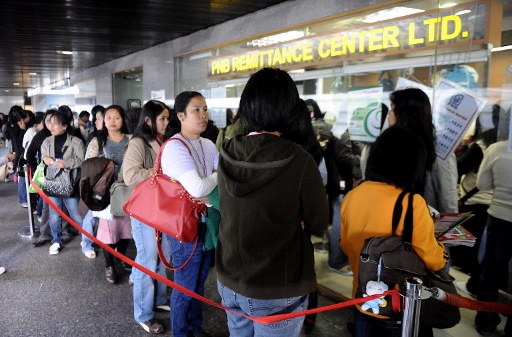COVID-19 pandemic curbing OFW remittances

Filipino domestic helpers line up to send money at a remittance center in the central district of Hong Kong in this 2008 file photo. AFP PHOTO/TED ALJIBE
The Philippines may see a slowdown in remittances from overseas Filipino workers (OFWs) for the first time in decades this year as the COVID-19 pandemic cuts jobs across the globe, seizing away the country’s long-time cushion against economic downturns.
Ayala-led Bank of the Philippine Islands (BPI) sees remittances coming through its channels turning flat, at best, this year or contracting by at least 5 percent compared to last year’s inflow.
ING economist Nicholas Mapa, on the other hand, said total remittances from overseas Filipinos would likely contract by 2.5 percent this year, adding that with lockdowns implemented in several countries, OFWs may not have enough income to send back home to their families in the first place.
Last year, OFWs sent a total of $30.1 billion to local beneficiaries.
Mapa cited a worrisome trend showing that more than 16,000 Filipino workers were returning home from host countries and sea-faring vessels after losing their jobs due to COVID-19.
Article continues after this advertisementBPI chief financial officer Maria Theresa Marcial-Javier said remittances coming through BPI had slowed down in March both on a year-on-year and on a month-on-month basis.
Article continues after this advertisementShe said the zero growth to 5-percent contraction in remittance flows was BPI’s base case assumption. “But based on what we’re seeing on the ground, it might look worse than that,” Javier said.
Union Bank is projecting a 16-18 percent drop in remittances from OFWs and an increase in the local unemployment rate of 6.1 percent this year from 5.1 percent last year.
The Bangko Sentral ng Pilipinas (BSP) earlier projected that remittance flows to the country this year could still grow by a modest 2 percent this year.
These remittances have consistently grown at an average of 4.1 percent, with OFWs routinely sending home an average of $2.3 billion a month over the past five years. These flows have in turn boosted local incomes to support consumption and more recently capital formation with the Filipino middle class ushering in an investment boom, Mapa said.
“OFW remittance flows have been consistent to say the least, even in the face of previous global economic slowdowns. The natural hedge of Filipinos deployed across the globe meant that weaker remittances from one region of the world could be compensated for by funds sent from less affected areas,” Mapa said.
“COVID-19, however, challenges this view, with the virus spreading to almost every corner of the globe,” Mapa said.
With the Philippines losing such OFW “remittance cushion,” Mapa said ING was now expecting a worst-case scenario of 2.2-percent gross domestic product (GDP) contraction this year.
“Furthermore, we expect depreciation pressure to hit Philippine peso once the lockdown is lifted as corporate import demand resumes with the government announcing it pursue its infrastructure plans in the second half of the year. Remittance data for February is delayed but we expect 2020 data to record several months of contraction as more and more Filipino workers are sent home due to COVID-19,” Mapa said.
The economist said the loss of remittance support coupled with a resumption of import demand induced by government’s infrastructure plans may drag the peso to P52.67 against the US dollar by yearend. However, the government’s recent announcement that it had secure up to $6.5 billion worth of foreign borrowings could temper the depreciation trend, he added.